How Does the Public Feel About Sex Among Teenagers?
And what role does religion play in shaping these views?
This post has been unlocked through a generous grant from the Lilly Endowment for the Association of Religion Data Archives (ARDA). The graphs you see here use data that is publicly available for download and analysis through link(s) provided in the text below.
I was poking around a couple government websites the other day and came across a pretty surprising statistic. The National Center for Health Statistics reported that among females aged 15-19 the birth rate was 62/1000 in 1991. The provisional data from 2022 reported this rate was now 13.5/1000. In other words for every teen girl who gave birth in 2022, there were 4 in a similar life circumstance three decades earlier. That’s a tremendous shift in teen pregnancy. But the why that decline is occurring isn’t at all clear. Some possible reasons are easier access to contraceptives, and more sex education in public schools. Another explanation is from Jean Twenge’s excellent book Generations which finds that young people are just having less sex than teenagers in previous decades.
But why is sexual activity down among young folks? One possible explanation is that there’s more stigma around teen sex now. It doesn’t takes a great amount of theorizing to assume that when parents and trusted adults express a less permissive view of teen sex, then it’s going to result in less sexual activity. But that’s contingent upon the public actually changing its views on this topic. But is that actually happening?
The General Social Survey has been asking a question about this topic since 1986. There’s a battery about sexual behavior in a number of circumstances. Here’s how this one is phrased, “What if they are in their early teens, say 14 to 16 years old? In that case, do you think sex relations before marriage are always wrong, almost always wrong, wrong only sometimes, or not wrong at all?” Here’s how views on this topic have shifted during the entire time series.
The “always wrong” option has clearly been the most popular choice across the last 35 years. In those early years of the survey about two in three respondents believed teenage sex to be always wrong. That share actually rose just slightly over time and was above 70% for a period of time that ran from the late 1990s through the mid-2000s. But, there has been a noticeable decline in this viewpoint in the last decade. By 2016, just 60% were saying “always wrong” and the last two surveys (collected in 2021 and 2022) put this number at 43%, easily the lowest of all time.
If that share is declining, what view are they shifting to? The biggest move is among those who say it’s “not wrong at all.” For decades, that share of the sample was little more than a rounding error - never more than 5% of the sample. But you can clearly see that this has changed in the last ten years. Now, about 20% of the sample says that 14-16 year olds having sex is not wrong at all. That’s about the same share who chose the “almost always” and “sometimes” wrong options.
So, there’s clearly a shift happening here - but why? Who has changed their view on this topic in the last couple of years? An easy explanation is that non-religious Americans have a different sexual ethic than a group like evangelicals or Catholics and the nones have been rising, so maybe that explains it.
Evangelical sexual ethics has shifted very little over the last 35 years. In 1986, 78% of evangelicals thought that two teenagers having sex was always wrong. In the 2022 data that was down to 70%. A decline, for certain, but it’s relatively small. The only group in this analysis who has shifted less are Black Protestants - it was 64% in 1986 and 62% today. For the other two Christian groups, the shifts have been much larger.
Among the mainline, about two in three thought that teenage sex was always wrong as late as 2010. Things have moved quickly from there - in 2022, less than half of the mainline thought sex between 14-16 year olds was always wrong. I am pretty struck by the similarity between the mainline and Catholics on this question. They basically started at the same spot and ended at the same level: 46% believing that teen sex is always wrong.
A majority of the nones have never been opposed to two teenagers having sex. It was only 35% in the 1986 sample, and today that’s down to 25%. Statistically speaking, the non-religious sample is a clear outlier on this metric. But that figure alone doesn’t fully explain the top level result, the shift in sexual ethics is also related to changing views among mainline Protestants and Catholics.
I keep thinking that this may be an age issue. It seems probable that younger adults are more permissive than older ones. Let me check on that possibility.
The data shows you can generally divide Christianity into two camps on this issue: Evangelicals and Black Protestants are in one group and mainline Protestants and Catholics are in the other. The age gap on this issue among evangelicals is really small. Among 18-35 year olds, 66% think that teen sex is always wrong. It’s 13 points higher among the oldest evangelicals. Among Black Protestants, the youngest cohort is probably an outlier because of a small sample size. I just don’t know if I see a clear trend line for this group.
However, among the mainline and Catholics - there’s an unmistakable relationship between age and views of teen sex. For mainline Protestants who are under the age of 45, only about 22% believe that 14-16 year olds having sex is always wrong. But it’s not like older mainliners take a hardline on this, either. It’s just 57% opposition among retired mainline Protestants. For Catholics, the youngest cohort is the outlier here. Once you get to 36 year olds and up, the differences are fairly minor.
When I was looking at the results for the non-religious, I was really intrigued by the fact that the youngest age groups of nones look about the same as young mainline Protestants.
But this is just a snapshot of age from data collected in 2021 and 2022. It’s possible that a lot of these older folks today had a pretty libertine view of sexual behavior when they were in their twenties or thirties. I can test that possibility by doing a cohort analysis.
There’s a repeated shape among the top two rows of results - rainbows. When it comes to the question of two teenagers having sex, views were more permissive at the beginning of the time series, but then opposition began to rise. In looks the 2000s was peak “prudeish-ness” in American society for a wide swath of the country - basically everyone born between 1940 and 1979. But you can see that views of teen sex have shifted in a more open direction in the last decade. And it’s across a whole bunch of cohorts, too. People born in the early 1940s and the late 1970s have the same pattern.
But the bottom row is just a whole different trend. Decline is the name of the game - there are no rainbows here. For older Millennials, opposition to teen sex was about 65% in the early 2000s, it’s down to about 45% today. For the other cohorts, it’s a decline as well. Among those born in the late 1990s, just 25% think that sex between 14-16 year olds is always wrong.
But when I looked at this cohort analysis, it reminded me of a prior post where I looked at the issue of extramarital sex. That question was posed this way, “What is your opinion about a married person having sexual relations with someone other than the marriage partner--is it always wrong, almost always wrong, wrong only sometimes, or not wrong at all?”
I wanted to compare the results from the teen sex question to the one about extramarital sex. Here’s what I get.
I was surprised by how small the gaps were between the two lines in the top row. Older folks don’t really make a huge distinction between sexual behavior in those circumstances. But, in the second row, a gap shows up. Among people born between 1960 and 1979, they definitely have a much dimmer view of extramarital sex than teen sex. That difference is also apparent in the bottom row, too.
But what about the overall trend lines? I think you can see a lot of that curvilinear relationship that appeared in the first graph. A more conservative sexual ethic was growing through the 1990s and the early 2000s. It peaked around 2005 or so. Then, views became a bit more permissive in the last decade. But it does look like the downward trajectory for the “teen sex” line is a bit more dramatic than the one for the “extramarital sex” one.
This paints a pretty nuanced portrait around the issue of teenagers having sex. As mentioned previously, Jean Twenge’s work found that American high school students are having less sex and the teen pregnancy rate has dropped by about 75%. Those two things seem logically related to each other. But why are teens having less sex? It doesn’t seem to be because the culture is telling them that it’s always wrong. In fact, the data from the GSS points in the opposite direction - views have actually liberalized significantly in the last ten years.
So, if there is more permissiveness in the culture, why is sexual behavior declining among the youth? I mean, take your pick from: it’s the cell phones, delayed adolescence, or the fact that Gen Z is the safest generation in American history. Sometimes those shifts can lead to outcomes that are both positive in some ways and negative in others.
Code for this post can be found here.
I assume that some of the people who are reading this newsletter would like to work in the field of data and religion. Well, I’ve got an ideal opportunity for someone who wants to get their foot in the door.
Barna is currently looking for a Research Analyst. This is a mid-level role that would report to Barna’s new VP of Research. Tasks include: data collections, data cleaning and primary analyses. The role is in Fort Worth, Texas.
More information about the position can be found here.




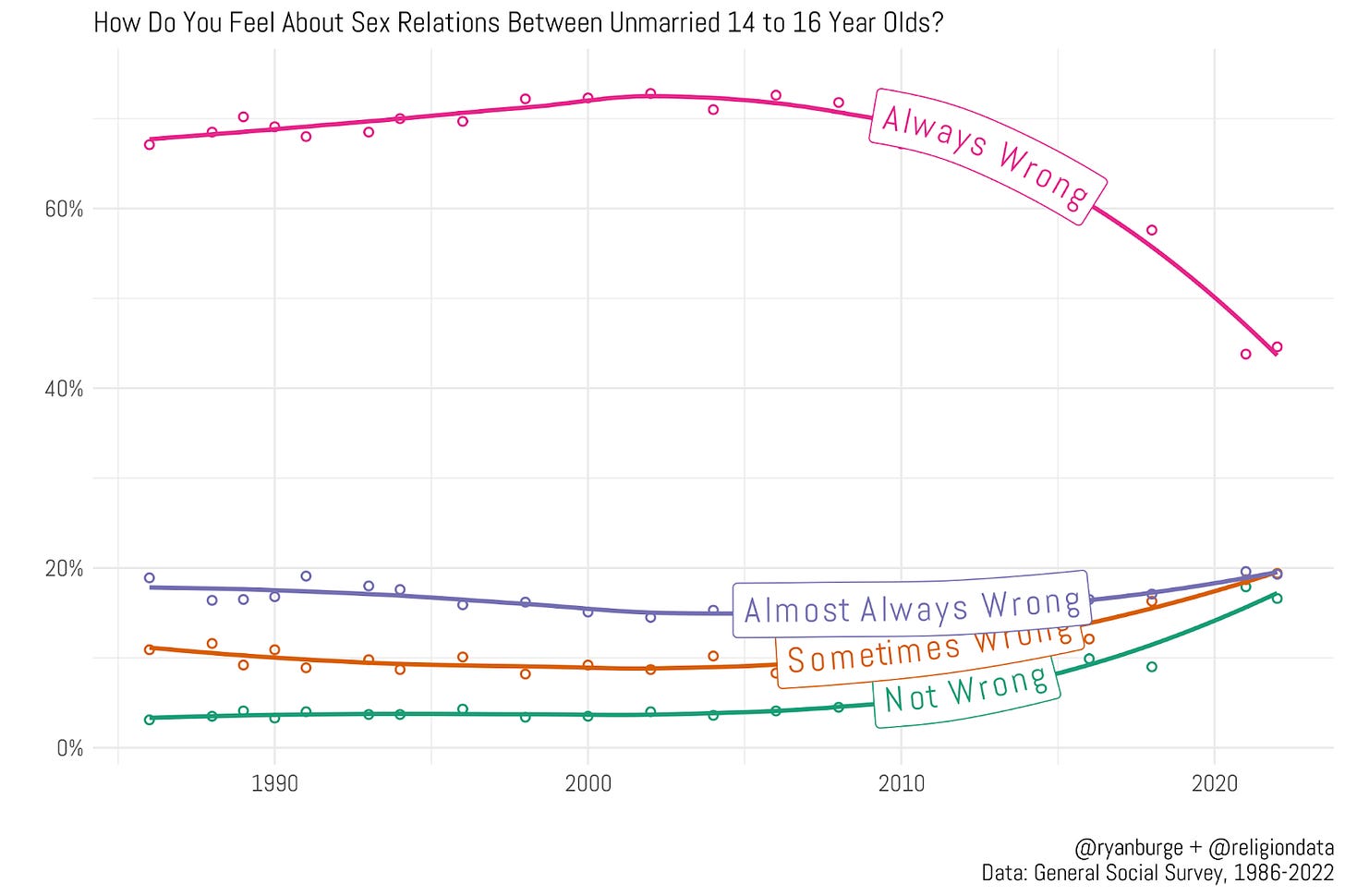
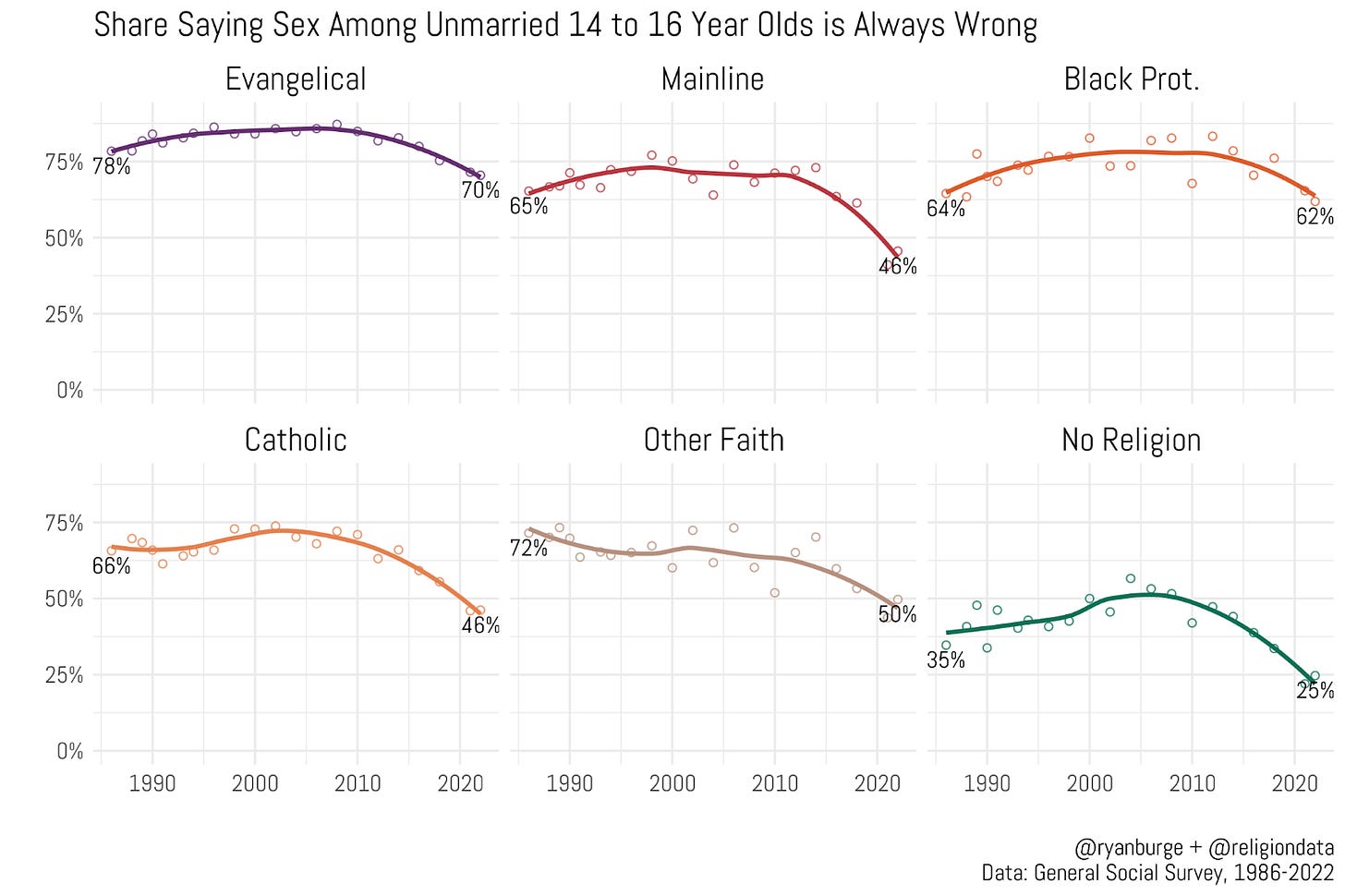
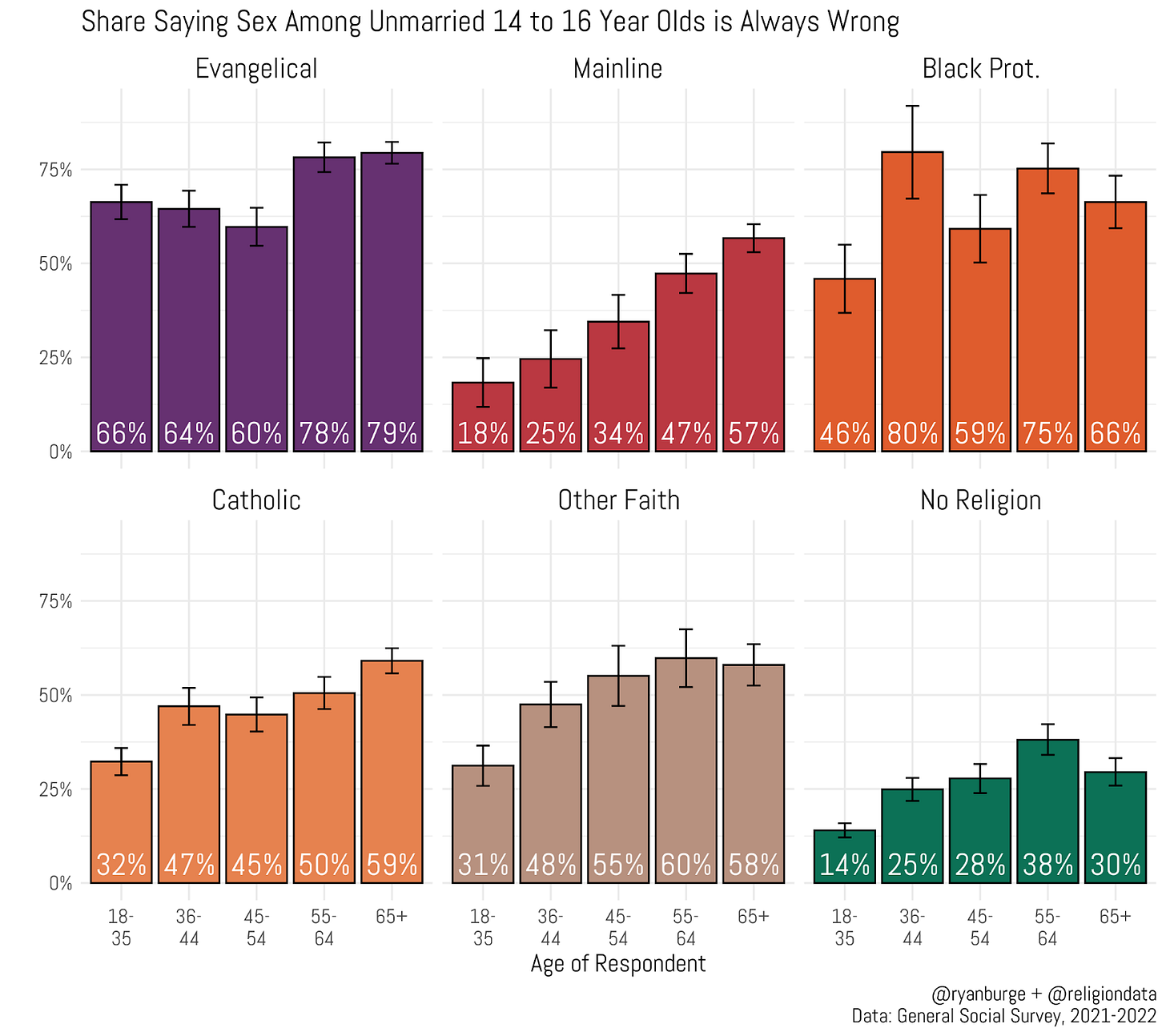
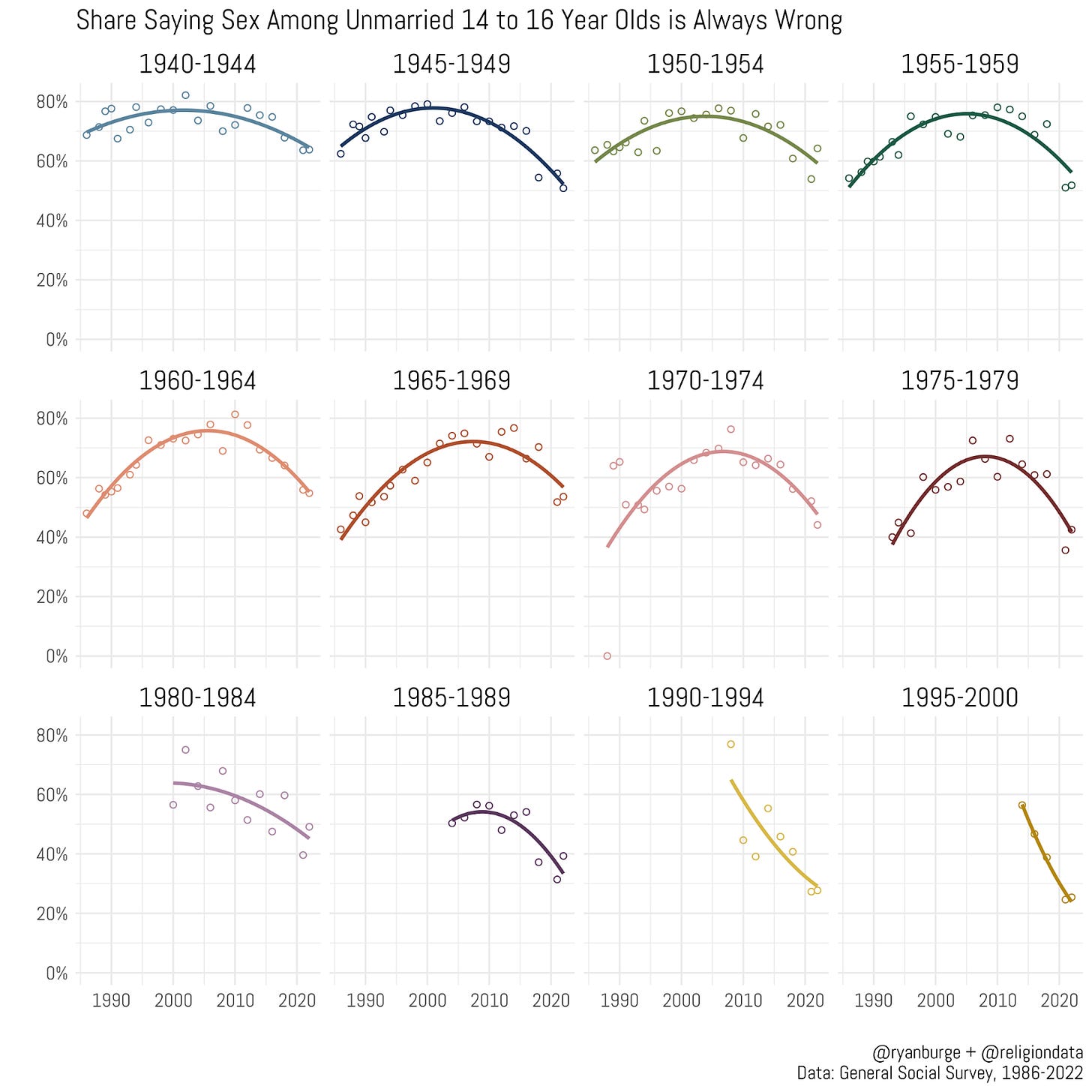
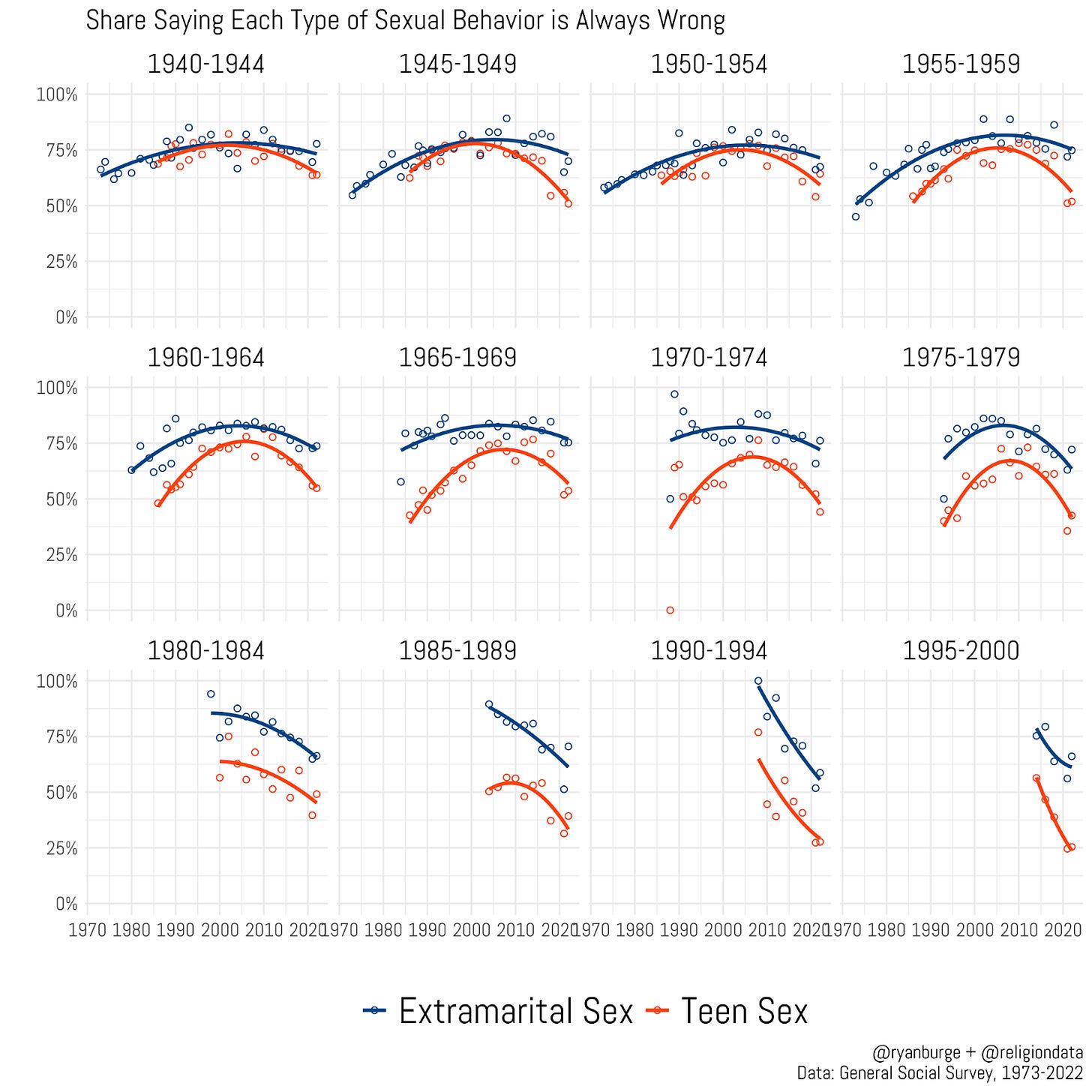

The wording on this question is interesting to me. Based on the question asked, I would probably answer ‘sometimes wrong’ based on concerns about knowledge, consent, etc. However, if the question were ‘is sex between 14-16 year olds a bad idea?’ I would answer Almost Always. I think a lot of the younger generations make more distinctions between what is ‘morally wrong’ and what is a generally a good or responsible choice. Obviously, you don’t have the data, but I would be very interested in the difference between those two concepts.
A completely different factor for the decline of teen pregnancies could be teen driving. The percentage of teenagers getting a license is dropping and the age they get a license is driving. There are also restrictions on teens for who can be in the car. Less ability to make your own privacy could also lead to less sex and fewer pregnancies.